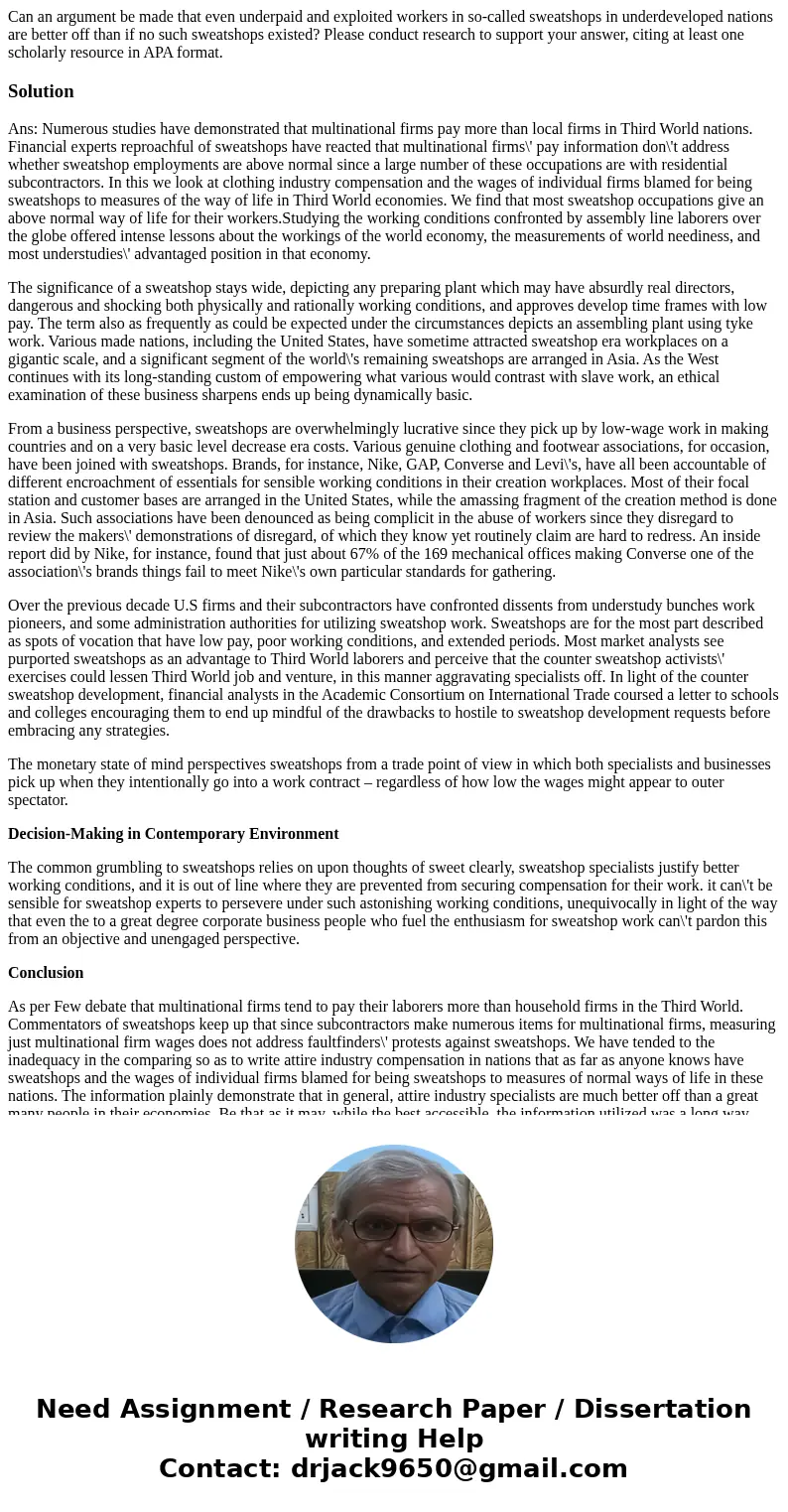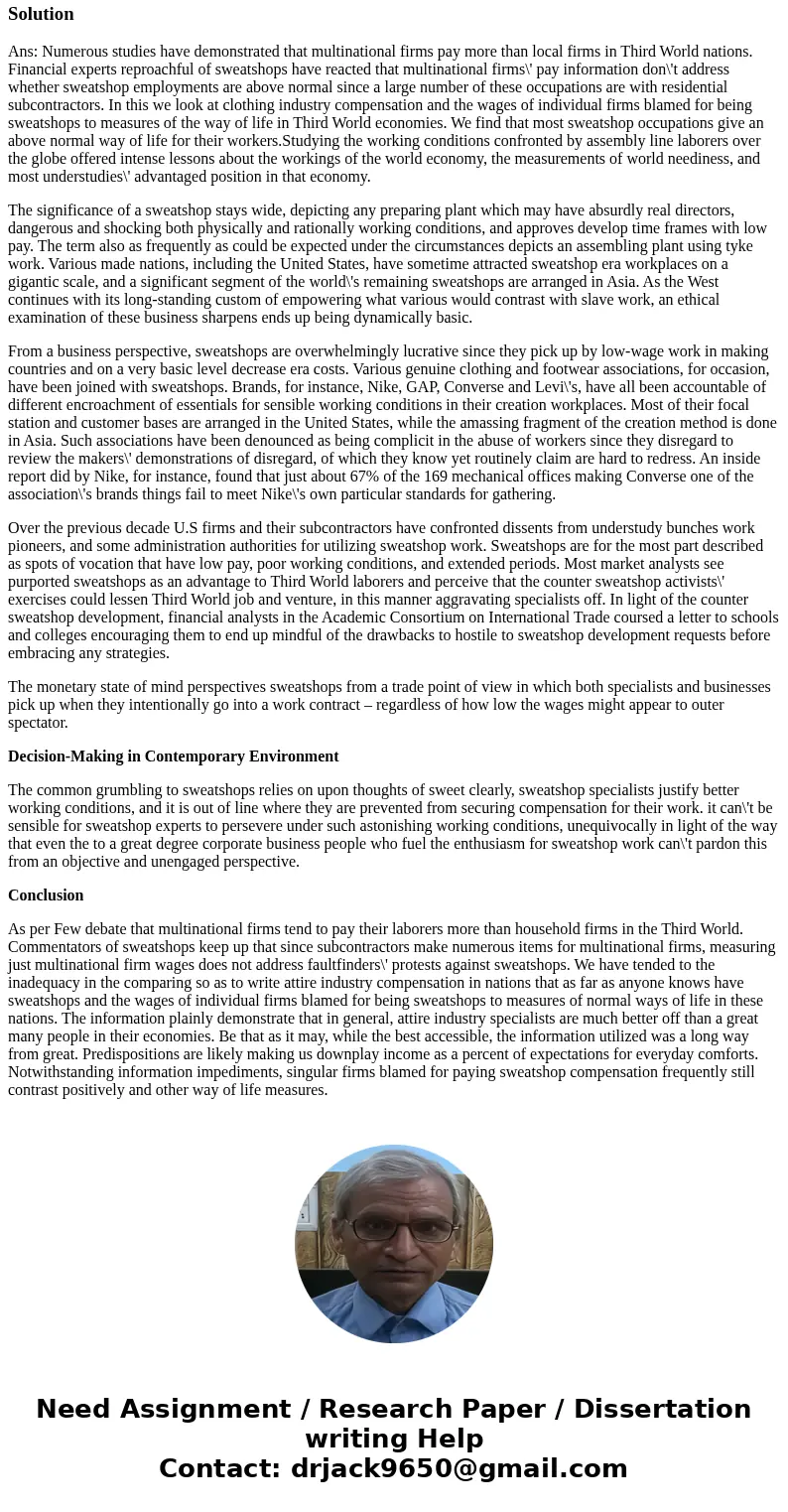Can an argument be made that even underpaid and exploited wo
Can an argument be made that even underpaid and exploited workers in so-called sweatshops in underdeveloped nations are better off than if no such sweatshops existed? Please conduct research to support your answer, citing at least one scholarly resource in APA format.
Solution
Ans: Numerous studies have demonstrated that multinational firms pay more than local firms in Third World nations. Financial experts reproachful of sweatshops have reacted that multinational firms\' pay information don\'t address whether sweatshop employments are above normal since a large number of these occupations are with residential subcontractors. In this we look at clothing industry compensation and the wages of individual firms blamed for being sweatshops to measures of the way of life in Third World economies. We find that most sweatshop occupations give an above normal way of life for their workers.Studying the working conditions confronted by assembly line laborers over the globe offered intense lessons about the workings of the world economy, the measurements of world neediness, and most understudies\' advantaged position in that economy.
The significance of a sweatshop stays wide, depicting any preparing plant which may have absurdly real directors, dangerous and shocking both physically and rationally working conditions, and approves develop time frames with low pay. The term also as frequently as could be expected under the circumstances depicts an assembling plant using tyke work. Various made nations, including the United States, have sometime attracted sweatshop era workplaces on a gigantic scale, and a significant segment of the world\'s remaining sweatshops are arranged in Asia. As the West continues with its long-standing custom of empowering what various would contrast with slave work, an ethical examination of these business sharpens ends up being dynamically basic.
From a business perspective, sweatshops are overwhelmingly lucrative since they pick up by low-wage work in making countries and on a very basic level decrease era costs. Various genuine clothing and footwear associations, for occasion, have been joined with sweatshops. Brands, for instance, Nike, GAP, Converse and Levi\'s, have all been accountable of different encroachment of essentials for sensible working conditions in their creation workplaces. Most of their focal station and customer bases are arranged in the United States, while the amassing fragment of the creation method is done in Asia. Such associations have been denounced as being complicit in the abuse of workers since they disregard to review the makers\' demonstrations of disregard, of which they know yet routinely claim are hard to redress. An inside report did by Nike, for instance, found that just about 67% of the 169 mechanical offices making Converse one of the association\'s brands things fail to meet Nike\'s own particular standards for gathering.
Over the previous decade U.S firms and their subcontractors have confronted dissents from understudy bunches work pioneers, and some administration authorities for utilizing sweatshop work. Sweatshops are for the most part described as spots of vocation that have low pay, poor working conditions, and extended periods. Most market analysts see purported sweatshops as an advantage to Third World laborers and perceive that the counter sweatshop activists\' exercises could lessen Third World job and venture, in this manner aggravating specialists off. In light of the counter sweatshop development, financial analysts in the Academic Consortium on International Trade coursed a letter to schools and colleges encouraging them to end up mindful of the drawbacks to hostile to sweatshop development requests before embracing any strategies.
The monetary state of mind perspectives sweatshops from a trade point of view in which both specialists and businesses pick up when they intentionally go into a work contract – regardless of how low the wages might appear to outer spectator.
Decision-Making in Contemporary Environment
The common grumbling to sweatshops relies on upon thoughts of sweet clearly, sweatshop specialists justify better working conditions, and it is out of line where they are prevented from securing compensation for their work. it can\'t be sensible for sweatshop experts to persevere under such astonishing working conditions, unequivocally in light of the way that even the to a great degree corporate business people who fuel the enthusiasm for sweatshop work can\'t pardon this from an objective and unengaged perspective.
Conclusion
As per Few debate that multinational firms tend to pay their laborers more than household firms in the Third World. Commentators of sweatshops keep up that since subcontractors make numerous items for multinational firms, measuring just multinational firm wages does not address faultfinders\' protests against sweatshops. We have tended to the inadequacy in the comparing so as to write attire industry compensation in nations that as far as anyone knows have sweatshops and the wages of individual firms blamed for being sweatshops to measures of normal ways of life in these nations. The information plainly demonstrate that in general, attire industry specialists are much better off than a great many people in their economies. Be that as it may, while the best accessible, the information utilized was a long way from great. Predispositions are likely making us downplay income as a percent of expectations for everyday comforts. Notwithstanding information impediments, singular firms blamed for paying sweatshop compensation frequently still contrast positively and other way of life measures.


 Homework Sourse
Homework Sourse